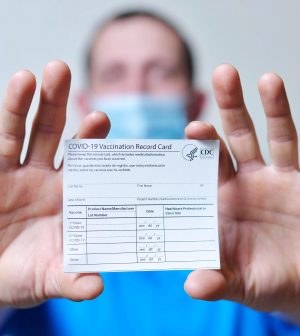- Could Your Grocery Store Meat Be Causing Recurring UTIs?
- Are You Making This Expensive Thermostat Error This Winter?
- Recognizing the Signs of Hypothyroidism
- 10 Strategies to Overcome Insomnia
- Could Artificial Sweeteners Be Aging the Brain Faster?
- Techniques for Soothing Your Nervous System
- Does the Water in Your House Smell Funny? Here’s Why
- Can a Daily Dose of Apple Cider Vinegar Actually Aid Weight Loss?
- 6 Health Beverages That Can Actually Spike Your Blood Sugar
- Treatment Options for Social Anxiety Disorder
High Rates of COVID Vaccination Among Adults With Autism

Adults with autism have high rates of COVID-19 vaccine acceptance and shots, a new study shows.
That’s good news, because autistic adults have multiple risk factors for COVID-19 infection and for more severe illness if they contract the disease, the researchers said.
“Reaching this group effectively in public health messaging about vaccination is critical,” said study co-author Kaitlin Koffer Miller, from Drexel University in Philadelphia.
To find out if public health messages about the importance of getting vaccinated have reached adults with autism, the authors sent online surveys to 431 autistic adults in Pennsylvania who had participated in previous research.
The responses were collected between March and August 2021. They showed that about 78% of survey respondents said they had received or intended to get a COVID-19 vaccine, and more than 55% said that they had received at least one dose.
In comparison, 42% of the overall adult population in Pennsylvania had received at least one dose of a COVID-19 vaccine as of the median response date for the survey (April 2, 2021), according to the study. The findings were published in the journal Vaccine.
Among adults with autism, vaccine accepters “were more likely to report increased loneliness during COVID-19, live in more populated counties and in counties won by President Biden in the 2020 U.S. presidential election,” said Koffer Miller. She’s director of policy impact with the Drexel Autism Institute Policy and Analytics Center.
“Positive relationships were found between wanting to protect others from COVID-19, concern about getting COVID-19 and trusting the safety of the vaccines,” Koffer Miller said in a university news release.
Concern about vaccine safety was common among those who were vaccine hesitant.
The findings can help guide efforts to increase vaccination rates among people with autism, according to the researchers.
“By understanding reasons for vaccine hesitancy — for example, concerns about vaccine safety — or vaccine acceptance, such as feelings of increased loneliness, amongst autistic adult respondents can help drive more effective public health messaging and vaccine outreach to this population,” Koffer Miller said.
The study suggests ways that public health agencies can promote vaccination to people with autism, including using visual methods such as social stories, which explain social situations to help autistic people learn socially appropriate behavior and responses.
More information
The Autism Society has more on COVID-19.
SOURCE: Drexel University, news release, May 3, 2022
Source: HealthDay
Copyright © 2026 HealthDay. All rights reserved.










